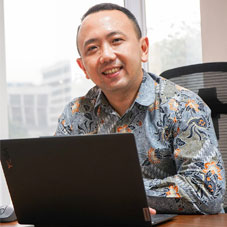
Yussy Santoso
Human Resources Director
As a key member of the executive team, in any business, the CHRO is responsible for aligning human resource strategies with the overall objectives of the business. This includes developing and implementing policies that foster a positive work environment, driving talent acquisition and retention, and overseeing employee development programs. By acting as a strategic partner, the CHRO ensures that human capital aligns with business goals, driving both employee satisfaction and organizational performance. One such leader, Yussy Santoso currently serves as the Human Capital Director at PT Mandala Multifinance Tbk., a role he has held since March 2023. With a career spanning over two decades, Yussy has accumulated extensive experience across various industries, including ceramics, glass, pharmaceuticals, fashion, and finance. His previous roles include HR Director at PT Mulia Industrindo, Tbk., Corporate Organization Development at Corporate Asia Pulp and Paper, and Vice President of Human Resource Business Partner at PT Bank ANZ Indonesia, among others.
Yussy holds a Master of Management in Marketing from the University of Pelita Harapan and a Bachelor of Engineering in Construction from Tarumanagara University. He is also pursuing a Doctoral Degree at Bina Nusantara University. His expertise is supported by certifications in areas such as Organization Design, Job Analysis, Job Evaluation, Strategic and Performance Management, Talent Management, Staffing and Compensation Management, Quality Management System, Business Process Management, Learning Design and Development, Kaizen, Competency Model Development, and HR Digital Transformation. Let’s hear more from him in this one on one interaction.
How do these experiences contribute to your current role, especially in shaping HR strategies?
Business strategy encompasses evaluating future trends, market dynamics, competitor insights, and the resources needed for new plans. HR plays a crucial role in this process by developing and implementing programs that equip employees with the skills and competencies required to achieve strategic objectives. My background in HR and strategic formulation enhances my ability to align HR initiatives with future business plans, ensuring that HR contributes effectively to meeting these goals.
How do you align the people agenda with the organization’s overall vision and mission?
To ensure that the delivery of the people agenda aligns with the organization’s vision and mission, I employ several strategies. First, I ensure that the organization has a well-defined vision, mission, values, and objectives that are communicated clearly to all employees. Next, I establish KPIs that reflect the company’s mission and objectives, which are then broken down into functional and sub-functional goals. These goals are integrated into individual performance plans, using SMART criteria or OKRs to support strategic aims. I also implement clear measures and key performance indicators, along with data analytics, to track progress effectively. Additionally, I establish a strategic planning cycle that includes regular reviews and updates to ensure the plan remains relevant and aligned with organizational goals.
How do you create training and development opportunities that advance both the company’s progress and employees’ personal growth?
Our employee training and development program encompasses a range of educational activities aimed at enhancing employees’ knowledge and skills. This program includes technical training related to job duties, as well as soft skills development in areas such as people management, leadership, communication, strategic thinking, analytics, and business management. These initiatives are designed to prepare employees for higher positions and broader roles within the company. Training methods include group workshops, one-on-one sessions, formal education, job shadowing, mentoring, seminars, and on-the-job training. We view employee training and development as crucial to increasing engagement and retention, integrating these efforts into our broader talent management strategy.
What are the new ways you have pitched in leading the digitization of the HR process?
To drive value creation through HR digital transformation, I start by defining clear goals. I ask whether the transformation will simplify processes, if the goals are measurable, and if it will positively impact the business financially. For instance, my goals include enhancing HR productivity, reducing hiring costs, eliminating paperwork for efficiency, and improving process accuracy. Aligning transformation goals with business objectives is crucial.
I then assemble a team of managers and HR professionals to execute the project and establish a timeline. HR processes are categorized by their impact—removed, heavily changed, slightly changed, or unchanged—to set realistic expectations and guide the transition. Investing in analytics software is essential for supporting and measuring the transformation. Finally, I ensure that all stakeholders are prepared for the change by planning effective technology adoption strategies and fostering a culture of learning and adaptability.
What future opportunities do you envision for leading the company to create significant impact?
To drive maximum impact on business performance, future-ready organizations should embody three key traits: (a) a clear sense of purpose, (b) a unique value proposition that distinguishes their business, and (c) a culture that attracts and retains top talent. My goal is to guide the company toward becoming a future-ready organization with these characteristics. By establishing a clear purpose, offering a unique value proposition, and cultivating a strong, talent-focused culture, the company will be well-positioned to enhance its business performance and achieve significant impact.
What would be your advice to budding industry leaders?
To create a purpose-driven organization, companies should affirm their unique identity, which helps attract and retain employees and appeals to investors, particularly with the rise of ESG-related funds. Implementing effective talent management is crucial as automation and technology change job landscapes, emphasizing that talent is a valuable resource. Establishing a flatter organizational structure enhances agility and value creation by simplifying P&L structures and reinforcing business objectives with strong performance management. These strategies collectively support a company’s purpose, optimize talent, and adapt to complex business environments.
Yussy Santoso, Human Resources Director, Pt. Mandala Multifinance Tbk
Yussy Santoso, Human Resources Director at PT. Mandala Multifinance Tbk, is an HR expert specializing in executive search, organization development, and strategic management. He focuses on aligning HR strategies with business needs through digitalization.



.png)